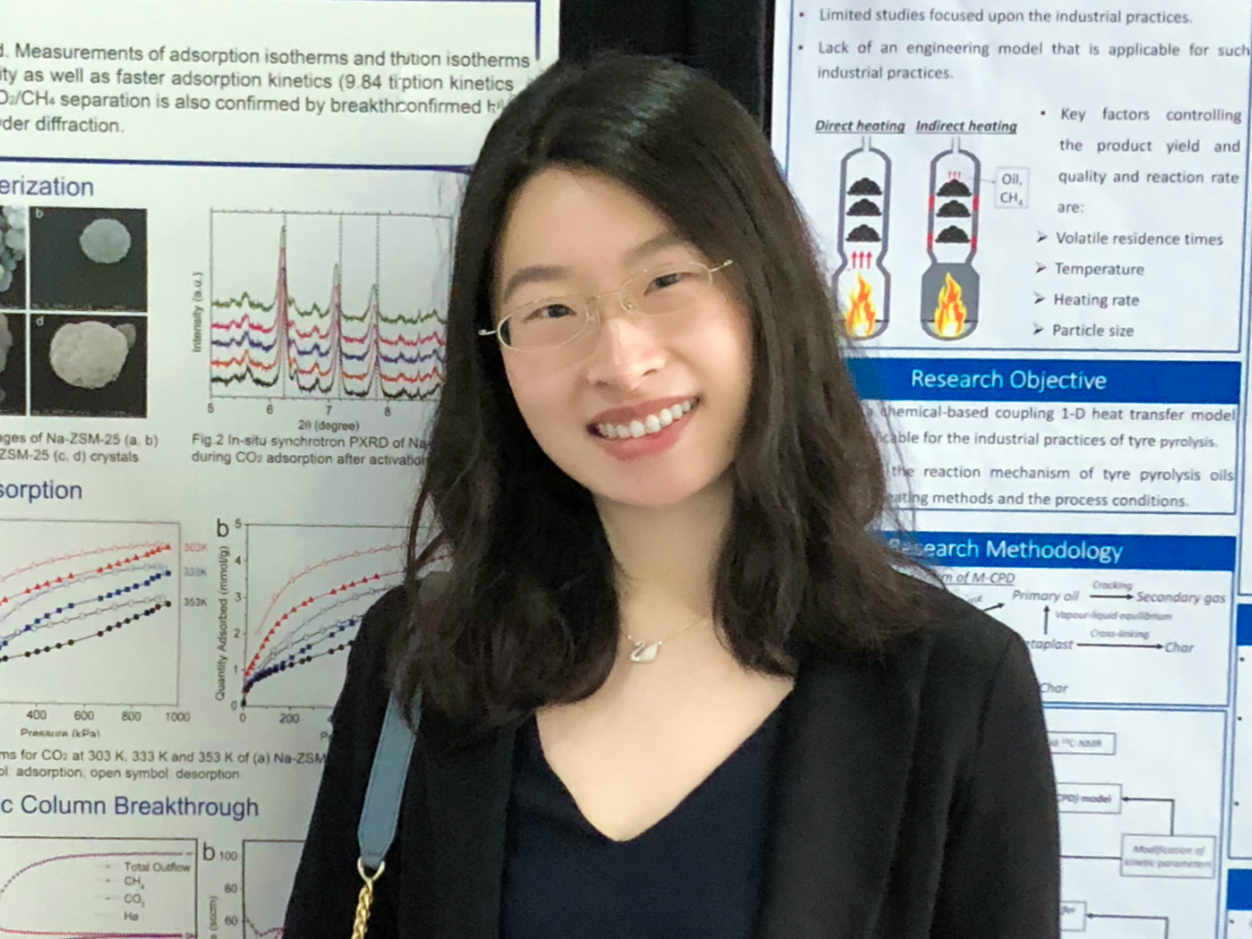Spotlight on a Student: Jianhua Zhao
Porous materials for energy-efficient gas separation and carbon capture
Jianhua Zhao is a final-year PhD candidate in Chemical Engineering at the University of Melbourne. Her research looks at the adsorbent materials for carbon capture and storage (CCS), developing narrow-pore zeolite for natural gas and coal seam gas purification, fabricating mixed-matrix membrane for CO2 and N2 removal.
After finishing her PhD by the end of 2019, she hopes to work for development of clean energy technologies and materials in either industry, academia or government institutes.
What is your research about?
My research aims to capture CO2 in natural gas and process streams, and N2 removal from methane-rich gas streams. I’ve spent my PhD developing materials including zeolites and membranes with high selectivity and CO2 capacity to achieve the separation process with less energy consumption.
Methane is an efficient and clean energy, and it is widely used in power generation and serve as a feedstock for chemicals. However, methane-rich gas streams such as natural gas and biogas may contain up to 15−50 vol % carbon dioxide, which reduces the calorific value and causes corrosion/blockage of pipelines. Therefore, developing an efficient separation technology is necessary to produce pure methane and reduce the greenhouse gas (GHG) emission. Microporous materials such as zeolites are promising adsorbents for gas separation (eg. flue gas/ natural gas/ biogas). My research commenced with developing and synthesizing advanced small-pore zeolite for highly CO2-selective adsorption with high kinetics from natural gas by fine-tuning their pore sizes using a number of techniques. This material was further tested for their adsorption capacities, kinetics and selectivity for CO2 over CH4. This material is able to adsorb the CO2 ten times faster than the untreated zeolite (ZSM-25) without compromising the selectivity. This work opens up the possibility of using narrow-pore zeolites for natural gas purification which have been limited because they absorb gas too slowly.
Inspired by the property of this material where admission of CH4 is exclusively prohibited at room temperature, I started to look at the challenging problem: N2 and CH4 separation. The current separation approach of these two gases is cryogenic technology, which is very energy-intensive. Therefore, I started looking for a narrow-pore zeolite which could be able to selectively adsorb N2 rather than CH4 at around room temperature. To achieve this, I developed a novel “trapdoor” zeolite by introducing the “door-keeping” cations, and N2 molecules were free to diffuse and CH4 molecules were hindered, and this material showed an outstanding N2/CH4 selectivity of 17 at 273K. I also undertook the modelling to predict its separation behavior at different temperatures. This development opens new avenues for gas separations with similar physical and chemical properties and requires significantly less energy.
We’ve been able to fabricate a mixed-matrix membrane (MMM) by incorporating this “trapdoor” zeolite as fillers, and it is easy to manufacture and shows unique enhanced CO2 permeability and selectivity at high pressures. To explore this, we analyzed and uncovered the fundamentals of how molecules were separated through this membrane with optimal 5wt% of ZSM-25 zeolite.
Considering the urgency of climate change and increasing demanding for clean energy, I would like to see we will be able to utilize these materials to develop cleaner, more efficient technologies for today’s industrialized world.
Who are your supervisors?
I have a wonderful team of highly supportive supervisors. They are Prof. Paul Webley and Dr. Penny Xiao, both within the Department of Chemical Engineering at the University of Melbourne. I am also very lucky to have Dr. Gang (Kevin) Li and Dr. Ranjeet Singh in the group for being so helpful in my research.
Prof. Webley has worked in development and management of clean energy technologies, especially carbon capture for the past 15 years in industry and academia.
What do you want to do next?
I am looking for jobs now. I enjoy working in carbon capture, developing clean energy technologies and materials. My research is applicable in a multitude of scenarios, not only academia, but also government institutes and industry. I am excited to witness the growing awareness of supplying clean power and the transition away from fossil fuels. I would like to apply my knowledge obtained during my PhD in contributing towards positive societal change. I would like to keep my options open for an industrial job, in academics or governmental institutions.
Awards
I was a recipient of the Australian Postgraduate Award and Melbourne Abroad Traveling Scholarships in 2018 for American Institute of Chemical Engineers (AIChE) conference. I was also granted 2019 Clive Pratt Scholarship. I won the Postgraduate student energy awards (Australian Institute of Energy) in 2018 and the best Oral Presentation Award in MSA ECR Membrane Symposium 2019.
Jianhua and her supervisors warmly welcome any enquiries about her research. You can email her at jianhuaz@student.unimelb.edu.au.
